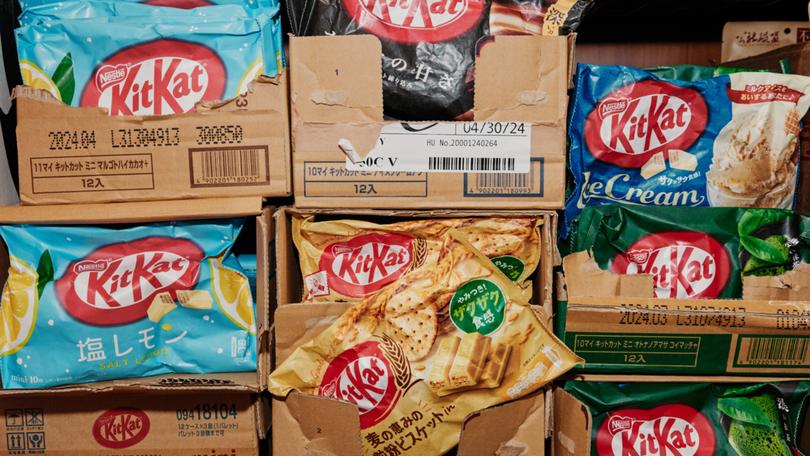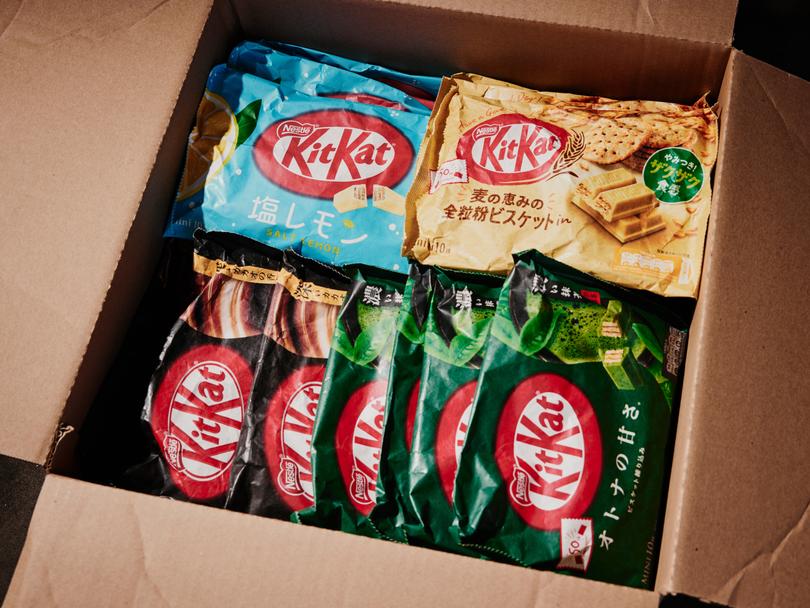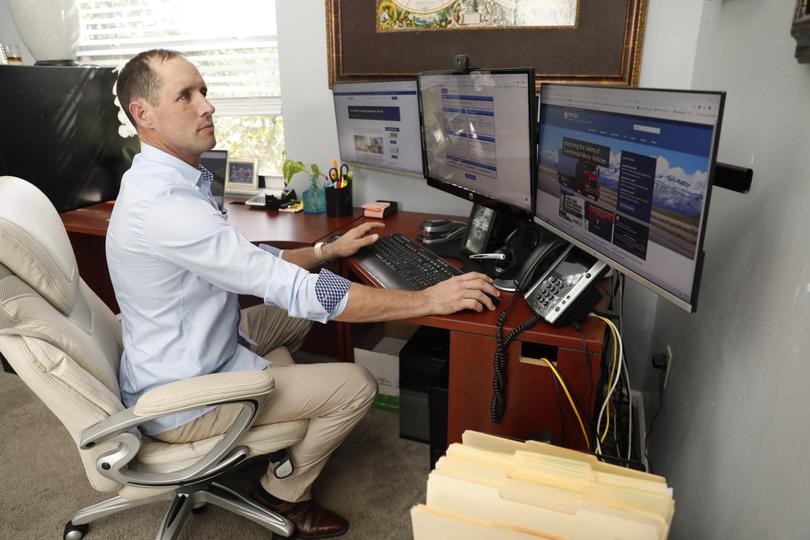The New York Times: How $250,000 worth of Japanese Kit Kats became the target of theft and extortion
It’s part identity theft, part extortion. The freight, sometimes called a “hostage load,” can vanish if the extortion demands are not met.

Danny Taing’s 55,000 Kit Kats began their long, twisted and sometimes obscure journey in Japan.
Taing is the founder of Bokksu, a New York company that sells Japanese snacks in subscription boxes, and he intended to make a tidy sum by flipping the sweets stateside.
The Kit Kat shipment, which included sought-after flavours such as melon, matcha latte and daifuku mochi, had cost $110,000, but Taing expected to make about $250,000 in total revenue.
Sign up to The Nightly's newsletters.
Get the first look at the digital newspaper, curated daily stories and breaking headlines delivered to your inbox.
By continuing you agree to our Terms and Privacy Policy.“You can fit a lot of Kit Kats into two containers,” Taing said.
And they are a booming business. In Japan, enthusiasts clamour for the rarer flavours, with some sold for just a few weeks or only in a specific region. In the United States, obsessives fawn over the collectibles, comparing reviews on Japanese snack blogs and shelling out for limited editions.

These particular Kit Kats would become the key components in an ultimately frustrating saga of shell email accounts, phantom truckers, supply-chain fraud and one seriously bewildered cargo freight broker.
Interviews and emails shared with The New York Times tell the story of just one instance of “strategic theft,” a growing corner of the criminal world that the FBI has said accounts for some $30 billion in losses a year.
The precious sweets landed safely enough in California, and were trucked 25 miles across Los Angeles County to a temporary storage facility in South El Monte, run by a company called Japan Crate Acquisition.
After chugging across the Pacific Ocean, they just needed to make the remaining leg of their journey to Bokksu’s warehouse in Carlstadt, New Jersey, and then into the hands of avid candy fans.
That’s where Shane Black came in.
Black, a freight broker in Sarasota, Florida, is part of an invisible army of professionals who coordinate and marshal the fleets of trucks that crisscross the country carrying everything from chickens to smartphones. For this job, Bokksu would pay him about $13,000.
Black got to it. He posted the job on a trucking board that is something like a Craigslist for freight. Someone named Tristan with HCH Trucking accepted the job (though he was using a Gmail account), and said he would have the shipment picked up shortly.
On Aug. 9, Tristan wrote in an email, “Hey man, The first one is loaded and rolling, the second one we’ll pick it up tomorrow first thing in the morning.”
“There was nothing out of the ordinary,” Black said in an interview.
Coming Clean
When the shipments failed to reach New Jersey days after any cross-country trip should have been completed, Black started to have visions of melted Kit Kats oozing from the trailers in the summer heat.
“Please tell me the freight is in good order and has been refrigerated this whole time?” he emailed Tristan.
Tristan replied that one of the trucks had broken down in Washington, Pennsylvania, a small city off Interstate 70 just southwest of Pittsburgh. Tristan reassured him that the Kit Kats were cool and intact, but “if it’s not fixed by today we will have to head back to the shipper and re-unload them there.”
That sent up all kinds of red flags for Black. If the truck was in good enough shape to drive the 2,400 miles back to California, why couldn’t it make it fewer than 400 miles to Bokksu in New Jersey? So Black called HCH Trucking.
“That’s when everything kind of hit the fan,” he said.
When he reached the HCH headquarters in Jersey City, New Jersey, he heard chaos in the background, sounds of panic. The representative told him that the company’s information appeared to have been compromised. It had never heard of any Tristan.

If Black wasn’t dealing with HCH Trucking, whom was he dealing with? And most important, where were the six figures’ worth of Kit Kats?
Seemingly on cue, Tristan followed up. “Time for some coming clean,” he confessed. “I’m actually a scammer and the owner of HCH doesn’t have anything to do with this.”
“Why though?” Black replied plaintively. “What would you stand to gain? Can I please get access to the loads so I can get them to NJ? We’re not a big company at all. Its just me … I’m the owner and everything else.”
Tristan wrote back, “We’re trying to make money sir, I told you we’re scammers, really sorry I didn’t know your story, and hopefully the loads get to NJ.”
The strange thing was that Black had never paid Tristan any money; the shipping fee was due on delivery. In any case, Tristan included the addresses of two refrigerated warehouses, both just east of Los Angeles, where he had dropped the loads. Black couldn’t believe his luck.
“When I found out they were at a cold-storage facility, I mean, I was just so happy,” he said. “I thought, ‘OK, we got the freight.’”
Out of Service
Black spun back into action. According to Tristan, one load was at Inland Empire Cold Storage in Jurupa Valley, California. The other was nearby, at Anytime Crossdock in Ontario, California. (Tristan then went silent, and did not respond to repeated emails from the Times seeking comment.)
Anytime was eager to get the load out of its warehouse and to be paid for nearly two weeks of storage.
It turned out that the Kit Kats had never left California. They had simply been driven 25 miles east, put on ice and left to rack up storage fees.
“We would like to know when you are going to get this picked up,” Anytime wrote, “as we anticipated this to be a short-term storage request.”

The outstanding balance for the storage was $3,830. Black said he paid $2,000 of that out of his own pocket to secure the release of the freight, with the promise to pay the rest later. (Anytime did not respond to multiple requests for comment from the Times.)
Daunted but determined, he started the process over, posting the job again on the freight board. This time he said he got a bite from Manny from MVK Transport Inc.
According to Black, Manny had the Kit Kats picked up. At least this half of the shipment was on its way to New Jersey, Black believed. After a few days, though, communications turned spotty.
“I’ve been writing you for days now,” Black emailed a few days later. “I called yesterday and you hung up and now your phone says it’s out of service.”
The next morning, he followed up, now furious: “How do you make money on this??? Are you going to sell kit kats on the corner???”
He’d been had again. This time, the Kit Kats had disappeared for good into the expanse of Southern California’s freeways. (Requests for comment sent to MVK went unanswered.)
Can’t Release Freight
Inland Cold Empire Storage, at least, still had the other half of the Kit Kats, and Black, by now frantic to salvage what he could of the candy, was still on the case.
“This load was stolen from us, and placed in your storage facility,” he wrote to Inland on Aug. 21. Inland replied that its contract was with a man named Harry Centa.
“There is no ‘Harry,’” Black explained, adding that Bokksu, copied on the email, was the rightful owner. “‘Harry’ is a fictitious name.”
Harry Centa, however, is not a fictitious name. Harry Centa lives in Ohio, and works in shipping. But the entire Kit Kat affair was news to him. “This is totally fraudulent and not me,” Centa said in an email to the Times. “Good luck and hope they find the Kit Kats LOL.”
Nevertheless, the verdict from Inland was final: “Without proof that you are the rightful owner and payment for storage we cannot release the freight.”

Black reached out to the sheriff’s departments of both Riverside and San Bernardino counties but said he was told jurisdictional issues kept them from getting involved, and no reports were filed.
He also turned to the team at Bokksu. Did they have anything that he could use to prove their ownership?
But Bokksu had essentially fired Black in the meantime, stopped payment on his fee, filed a report with the Los Angeles County Sheriff’s Office for insurance purposes and decided to move on. The Kit Kats were dead to Bokksu.
“I don’t know if I would be comfortable selling these to customers,” said Taing, Bokksu’s founder. “What if something actually happens to customers that eat this, and we get sued?”
Meanwhile, the Kit Kats are still at Inland, according to the company’s CEO, Kevin Sacalas.
“We have no use for this product and would happily release it to anyone who would show proof of proper ownership and pay the storage fees,” Sacalas wrote in an email to the Times.
Playing Chess
The Bokksu Kit Kats are just one instance of an increasingly common computer-based form of fraud that some experts call “fictitious pickups” or “strategic theft.” It’s part identity theft, part extortion. The freight, sometimes called a “hostage load,” can vanish if the extortion demands are not met.
“The more you unpeel the onion, the worse it gets,” said Keith Lewis, vice president for operations at CargoNet, which is part of the global data analytics and technology provider Verisk. He said that strategic cargo theft was up 700% this year.
“The supply chain is moving at the speed of light,” he said, adding: “The bad guys are playing chess and we’re playing checkers. We’re two or three steps behind them.”
As for Bokksu, its insurance claim has been denied. So the blame is now flowing backward along that supply chain.
Bokksu holds Black responsible. He fell for an obvious scam, they said, and the Gmail addresses should have been a red flag.
Black said truckers did not always use company domains. Ultimately, he blames Japan Crate Acquisition, which originally released the Kit Kats to “Tristan.”
“Obviously it didn’t go to an HCH truck,” Black said, and whoever loaded the shipment “should’ve been suspicious.”

In possibly the strangest twist on the Kit Kat trail, Bokksu announced in September that it had acquired Japan Crate. But the Times discovered that the acquisition had actually been completed back in June. So Bokksu, through a wholly owned subsidiary, had in effect overseen the loading of its own Kit Kats onto the original two fraudulent trucks.
“I’ve been doing this for over two decades now, and I’ve never come across anything like this, anything of this magnitude,” Black said. “It’s beyond crazy, it really is. Because there’s no answers.”
“I do feel cheated,” he added. “I just don’t know who is doing the cheating.”
This article originally appeared in The New York Times.
© 2023 The New York Times Company
Originally published on The New York Times
